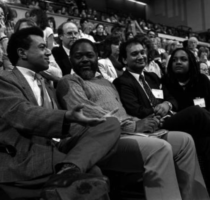Last week, writes Sunder Katwala, to mark the 50th anniversary of Enoch Powell’s ‘Rivers of blood’ speech, I stood in the very spot from which Powell delivered his speech, addressing an anti-racism rally organised by Dudley MP Ian Austin for local Labour Party members.
We heard Eleanor Smith’s story, as a women of African-Caribbean descent, of being Wolverhampton’s choice of MP in Enoch Powell’s old constituency, together with those of fellow midlands MPs Preet Gill and Shabana Mahmood.

I told the audience that Labour has been a trailblazer on race. That if you looked around the world, it might be difficult to find any other political party that has taken so much pride in having been a pioneer in fighting racism.
But I also spoke of my sadness that a party with that tradition and that history still has so much work to do today when it comes to tackling antisemitism in the Labour party itself.
That work must start with listening to the experiences and the pain shared by Jewish colleagues; believing them; and acting upon them too.
A democratic party is doing something impressive if tens of thousands, even hundreds of thousands of people want to join.
It may well be just 1% or 2% of those people come with antisemitic motivations. That may mean dealing with a thousand or two thousand people with toxic views.
So Labour does need to get in place a robust process and party culture able to deliver, if it is now going to make sure that the promise of zero tolerance of antisemitism can be kept.
The work of political education goes beyond those hardcore antisemites. In 1968 the Labour Government played a big part in helping to educate British society when it came to understanding what racism is and how to tackle it. Today, there is important political education work to be done to make sure the whole party understands what antisemitism is and how to tackle it.
It means everybody in the party understanding that, of course, it is legitimate to criticise the policies of Israel – but that it is never legitimate to do so using antisemitic tropes, nor always insisting that British Jews account for the state of Israel whenever they want to talk about antisemitism in Britain.
It means knowing that parties of the left will want to challenge corporate power and may mistrust the media too – but that doing so in a way that reinforces antisemitic stereotypes about Jewish domination of the media and business can never be acceptable. Such conspiracy theories can also bring the party into contact with toxic allies that should be shunned.
I feel sure many people in the Labour Party are desperate to get this right. But the party will keep going wrong if, when people hear about an allegation of antisemitism, they start by asking whether it comes from someone who is Labour or Tory; whether they are on the left or the right of the party; or how supportive they are of the party leader.
It is always easier to challenge your political opponents. It is much harder to challenge friends and allies. But that can be the test that really matters.
So Labour should have those political debates on everything else. It has got to do much more to get above factional politics on the issue of antisemitism if it is going to come together to sort it out.
The Labour Party has played an important role in making the Midlands and Britain a better place on racism over the last fifty years since ‘Rivers of Blood’. It continues to do so today. The party can be proud of that history – and should use it as inspiration to come together and live up to it again.






